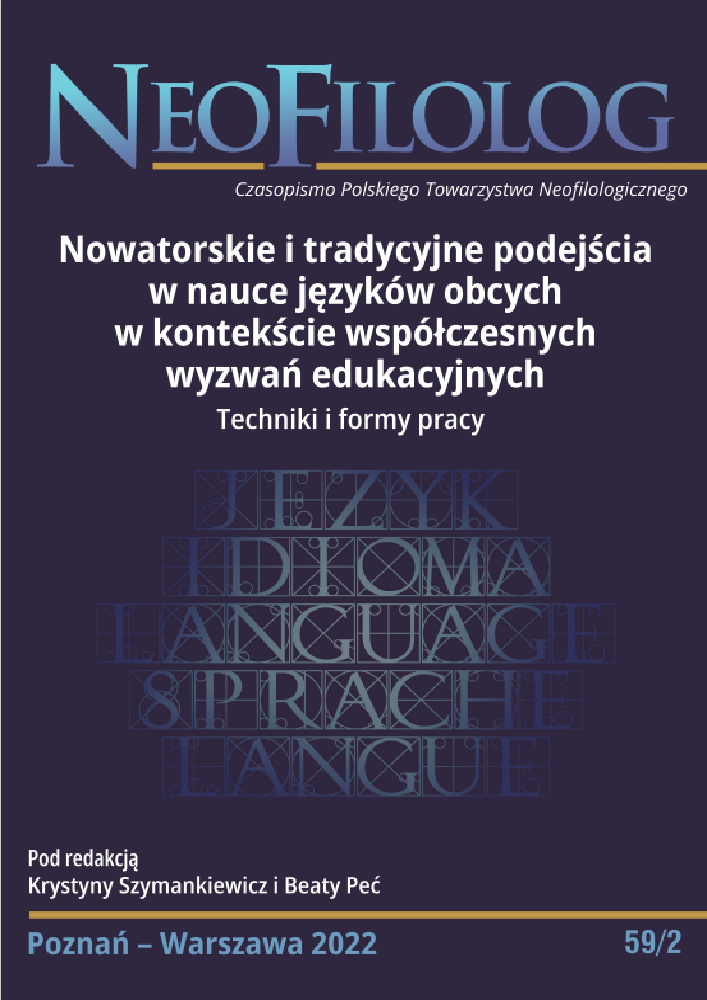Abstract
The global pandemic has forced changes in education. About 1.5 billion students worldwide have experienced school closures. The aim of the article is to present the results of the survey on teaching during coronavirus in secondary schools where the research group consisted of students and teachers. For many students and teachers, the new way of learning and teaching has been a great challenge and has caused many difficulties and has exposed deficiencies in education systems. During the research, the focus is on students, teachers, school principals and parents who had to find themselves in a new and tricky situation at school, which was distance learning. The research addresses aspects related to the situation, well-being and figure of students and teachers during the new virtual reality, methods of teachers' work in a virtual school, as well as the importance of principals and parents as a support for students and teachers during a global pandemic.
References
Brash B., Pfeil, A. (2017), DLL 09: Unterrichten mit digitalen Medien. Stuttgart: Ernst Klett Verlag.
Chałubińska-Jentkiewicz, K. (2019), Rozwój nowoczesnych technologii w kontekście procesu stanowienia prawa na przykładzie strategii AI. (w:) „TEKA Komisji Prawniczej PAN Oddział w Lublinie“, t. 12, nr 2, s. 53–71.
Główny Urząd Statystyczny (2021), Oświata i wychowanie w roku szkolnym 2020/2021. Główny Urząd Statystyczny / Obszary tematyczne / Edukacja / Edukacja / Oświata i wychowanie w roku szkolnym 2019/2020.
Heba A. (2009), Nauczanie na odległość – wczoraj i dziś. „Nauczyciel i Szkoła“, t. 3–4, s. 145–152.
Juszczyk S. (2002), Edukacja na odległość. Kodyfikacja pojęć, reguł i procesów. Toruń: Multimedialna Biblioteka Pedagogiczna, Wydawnictwo Adam Marszałek.
Juszczyk S. (2021), Edukacja na odległość, (w:) Siemieniecki B. (red.), Pedagogika medialna. Warszawa: Wydawnictwo Naukowe PWN, s. 251–285.
Kmiecik G. (2021), E-wykluczenie - zagrożenie dla współczesnej edukacji. „Pedagogika Przedszkolna i Wczesnoszkolna“, t. 9, nr 2(18)/2021, s. 97–107. https://doi.org/10.4467/23537159PPW.21.021.15181
Kopciał P. (2013), Analiza metod e-learningowych stosowanych w kształceniu osób dorosłych. „Zeszyty Naukowe Warszawskiej Wyższej Szkoły Informatyki“, nr 9/2013, s. 79–99.
Szabłowski S. (2009), E-learning dla nauczycieli. Rzeszów: Wydawnictwo Oświatowe FOSZE.
Szadzińska E. (2021), Wykluczenie cyfrowe podczas pandemii Dostęp oraz korzystanie z internetu i komputera w wybranych grupach społecznych. Federacja Konsumentów.
Zubik M. (2008), Nowe technologie jako wyzwanie i zagrożenie dla prawa, statusu jednostek i państwa, (w:) Girdwoyń P. (red.), Prawo wobec nowoczesnych technologii. Warszawa: Liber, s. 37–50.
OECD (2001), Understanding the Digital Divide. Paris: OECD. https://www.oecd.org/digital/ieconomy/1888451.pdf#:~:text=As%20used%20here%2C%20the%20term%20%E2%80%9Cdigital%20divide%E2%80%9D%20refers,the%20Internet%20for%20a%20wide%20variety%20of%20activities. (Zugang online: 01.11.2022).
License
Copyright (c) 2022 Filip Myszka

This work is licensed under a Creative Commons Attribution-NoDerivatives 4.0 International License.
Authors
Authors of texts accepted for publication in Neofilolog are required to complete, sign and return to the Editorial team’s office the Agreement for granting a royalty-free license to works with a commitment to grant a CC sub-license.
Under the agreement, the authors of the texts published in Neofilolog grant Adam Mickiewicz University in Poznań a non-exclusive, royalty-free license and authorize the use of Attribution-NoDerivatives 4.0 International (CC BY-ND 4.0) Creative Commons sub-license.
The authors retain the right to the free disposal of the work.
Users
Interested Internet users are entitled to use works that have been published in Neofilolog since 2017, under the following conditions:
▪ attribution – obligation to provide, together with the distributed work, information about the authorship, title, source (link to the original work, DOI) and the license itself.
▪ no derivatives – the work must be preserved in its original form. Without the author's consent, it is not possible to distribute the modified work in the form of translations, publications, etc.
Copyrights are reserved for all texts published since 2017.
Miscellaneous
Adam Mickiewicz University in Poznań retains the property right as a whole (layout, graphic form, title, cover design, logo etc.).

